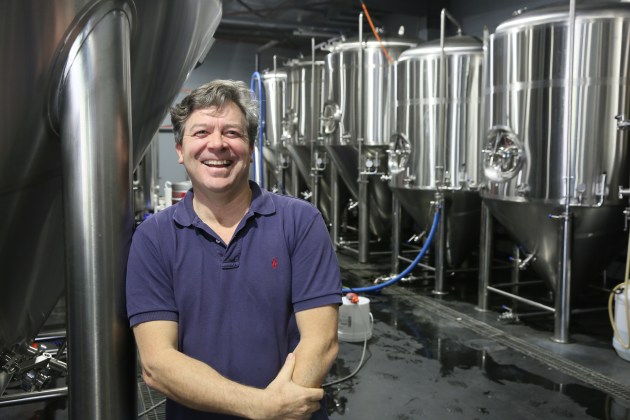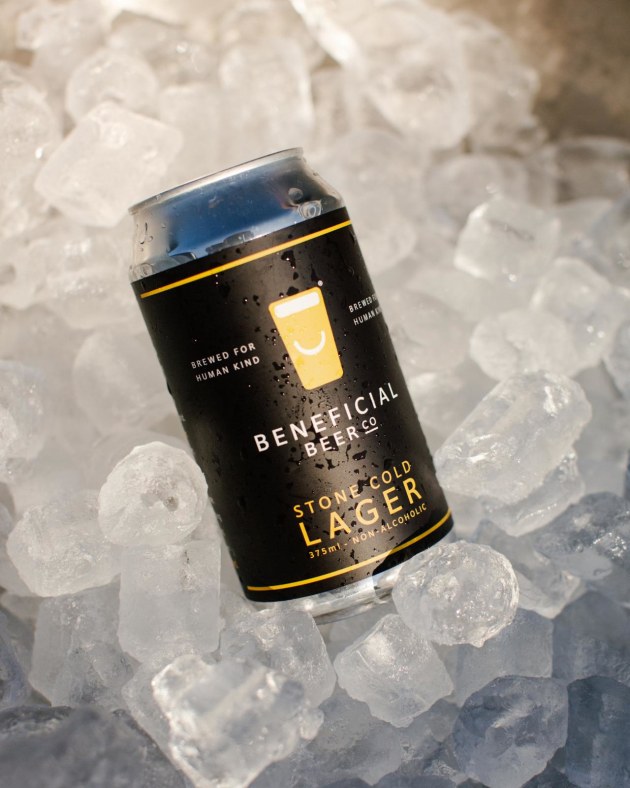The NoLo alcohol market has exploded in recent years, with many breweries and distilleries developing their own NoLo options. Pippa Haupt spoke to David Jackson about how his own sobriety goals drove him to create the Beneficial Beer Co.
In January 2020, David Jackson gave up alcohol. His personal struggle with drinking was the catalyst for the decision, but it only took a couple of weeks for Jackson to realise he was going to have to do more than just say no.
“In the early stages I was finding it really hard to manage my alcohol consumption, and I was finding it even harder to actually give up alcohol.
“I thought, if I can find something I can do to keep me sober, and make that my passion – I’ll stay sober. And if it is a passion, then I’ll be really good at it, and if I’m really good at it, it will be really successful,” Jackson says.

Jackson enlisted friend, and now co-founder and creative director, Matt Johnson to help create the brand, and the pair embarked on finding a brewer to work with.
When no brewers in Sydney were willing to help out, Jackson realised they were going to have to build the brewery themselves, and for that they needed money.
“I was pretty sure I could raise the money, but I knew I couldn’t if I didn’t know how to make beer,” Jackson says.
So Jackson applied for a beer brewing TAFE course in Queensland and relocated his family from New South Wales to Queensland for the six month duration.
“There were 85 people who applied, and TAFE accepted 10 people into the course, I spent six months learning how to make beer and learning how to run a brewery,” he says.
When the course finished, Jackson knew he would need expert assistance for the journey ahead, so enlisted the help of former Toohey’s brewing manager Bruce Peachey.
“I approached Bruce online, and asked him if he would come on board as a co-founder and as our head brewer,” says Jackson.
Peachey asked the important questions, “what sort of beer do you want to make?”
“I wanted to make a lager where I could sit at a pub and while everyone else is drinking beers, they wouldn’t even know I was drinking a non-alcoholic version,” Jackson explains.
After eventually finding a contract brewer to brew their lager, and securing the exclusive rights to an Australian made reverse osmosis alcohol removal filtration system, Jackson says they knew they had the ability to be a market disruptor.
The filtration system is affectionately called the ‘BBCo Black Box’.
Beneficial Beer Co. has exclusive use of the Australian-made filtration technology for five years in Australia, while they continue to use contract brewers for production.
Jackson says the production process has not been easy, but the company works to remain true to its cause.
“It has been a struggle to find a contract brewer that would use our method and take our technology onto their site.
“We are purpose and design led, and we're reaching an audience who prefer a modern classic lager.
“The lager is one hundred per cent natural, brewed using solar power, with a carbon neutral production process.
“Eventually, we would like toeducate our suppliers and seeour supply chains achieve carbon neutrality as well,”
says Jackson.
The brewing is kept intentionally simple, using a classic concoction of barley grain, water, hops and yeast as well as a traditional process for brewing a rich, mid-strength ‘no-frills’ lager.
“We’re not slowing down the brewing process or using special yeast blends that don’t ferment sugars; we brew a real lager,” says Jackson.

Once the lager is brewed to completion, the alcohol is extracted using the ‘BBCo Black Box’. Jackson says the system removes all the alcohol, and leaves all the flavour.
A testament to the technology, Beneficial Beer Co’sfirst batch of Stone Cold Lager won bronze for Best Non-Alcohol Beer at the Australian International Beer Awards in May.
On the horizon is further expansion. After a recent $600,000 capital raise, and ongoing capital campaigns, there are plans for distribution through the major supermarkets and construction of its own brewery.
This story first appeared in the August issue of Food & Drink Business magazine.







